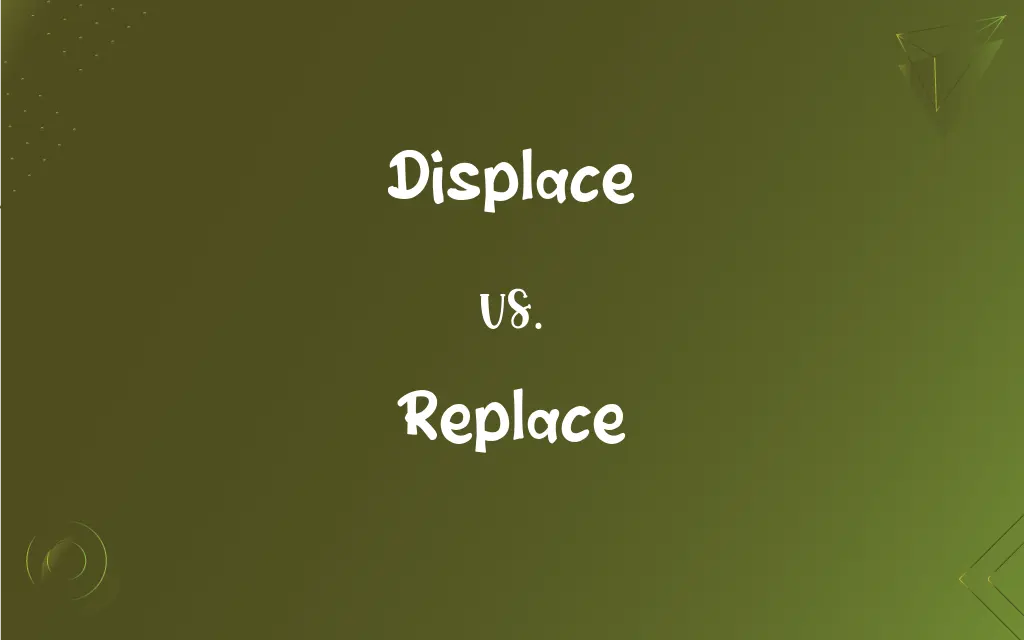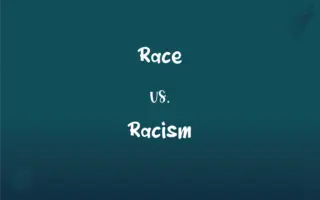Displace vs. Replace: What's the Difference?
Edited by Janet White || By Harlon Moss || Published on December 29, 2023
Displace means to move something from its usual place, while replace means to take the place of something or put something back in its place.

Key Differences
Displace often implies forcibly moving or shifting something from its original location, while replace suggests putting something new in the place of something old.
Displacement can occur without a replacement, such as when a population is displaced by a natural disaster. However, replacement always involves taking over a position or space, like replacing an old appliance with a new one.
In physics, displacement refers to the movement of an object from one place to another. In contrast, to replace in a mechanical context means to substitute a defective part with a functioning one.
Displacement can also imply a sense of loss or being out of place, as in cultural displacement. Replace, on the other hand, often involves renewal or restoration, such as replacing worn-out tires.
Displace can also mean to remove someone from a position or role. Replace in this context would mean to provide a substitute or successor for the removed person.
ADVERTISEMENT
Comparison Chart
Primary Meaning
To move or shift from a usual or original place
To take the place of something or to put something back in its place
Implication
Often suggests a forceful or involuntary move
Implies substitution or restoration
Usage in Science
Refers to the movement of an object in space
Involves substituting one element with another
Relation to Presence
Can happen without something else taking its place
Involves the presence of a new or restored element
Emotional Connotation
Often associated with loss or upheaval
Associated with renewal or restoration
ADVERTISEMENT
Displace and Replace Definitions
Displace
To force something to leave its place.
The new technology displaced older methods.
Replace
To restore something to its former condition.
The old windows were replaced with new ones.
Displace
To remove someone from a position or role.
The CEO was displaced by a younger leader.
Replace
To take the place of something.
Digital books are replacing paper ones.
Displace
To move something from its usual place.
The floodwaters displaced many residents.
Replace
To put something back in its place.
He replaced the book on the shelf.
Displace
To take over the place or position of something.
Online streaming services have displaced traditional TV.
Replace
To provide a substitute for something.
The team replaced the injured player.
Displace
In physics, the movement of an object from one point to another.
The displacement of water is used to measure volume.
Replace
To assume the role or position of something.
She replaced him as the team leader.
Displace
To move, shift, or force from the usual place or position
Wasn't the net displaced before the puck went in?.
Replace
To put back into a former position or place
Replaced the sofa after vacuuming.
Displace
To force to leave a place of residence
The conflict displaced thousands of people.
FAQs
Can displace indicate involuntary movement?
Yes, often it implies a forceful or unintended shift.
Does displacement require a replacement?
No, displacement can occur without something else taking its place.
Can replace imply restoration?
Yes, like replacing old parts with new ones.
Is replacement always about introducing something new?
Often, but it can also involve restoring the original state.
Is replacing always voluntary?
Not necessarily, it can be due to necessity or external factors.
Can displacement be beneficial?
In some contexts, like technological advancement, it can be.
Can one be displaced from a job?
Yes, it means being removed or replaced in a role.
Can a person replace another in a job?
Yes, it means taking over someone's role or position.
What does 'displace' mean?
Moving something from its usual or original location.
Is displacement always physical?
No, it can also refer to social or cultural contexts.
Are displaced items always found?
Not necessarily, they may remain misplaced or lost.
Can one replace a lost item with an identical one?
Yes, that’s a common use of replace.
What does 'replace' mean?
To take the place of something or put back something in its place.
Does replacement always solve the problem?
It depends on the context and the effectiveness of the substitute.
Is it possible to replace a unique item?
Only in function, not in sentimental or historical value.
Can displacement be emotional?
Yes, like feeling displaced in a new environment.
How does displacement affect communities?
It can lead to upheaval, loss of home or identity.
Can historical buildings be displaced?
In a manner of speaking, by being overshadowed by new constructions.
Do replace and displace have the same origin?
They have similar linguistic roots but have evolved differently.
Can displacement lead to innovation?
Yes, as it can necessitate finding new solutions or adaptations.
About Author
Written by
Harlon MossHarlon is a seasoned quality moderator and accomplished content writer for Difference Wiki. An alumnus of the prestigious University of California, he earned his degree in Computer Science. Leveraging his academic background, Harlon brings a meticulous and informed perspective to his work, ensuring content accuracy and excellence.
Edited by
Janet WhiteJanet White has been an esteemed writer and blogger for Difference Wiki. Holding a Master's degree in Science and Medical Journalism from the prestigious Boston University, she has consistently demonstrated her expertise and passion for her field. When she's not immersed in her work, Janet relishes her time exercising, delving into a good book, and cherishing moments with friends and family.






































































